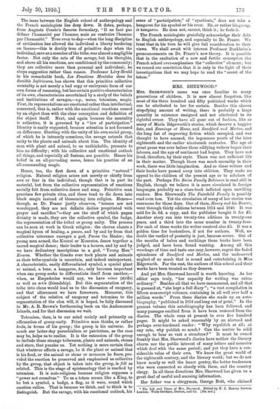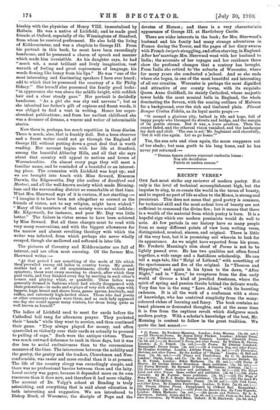MRS. SHERWOOD.*
MRS. SHERWOOD'S name was once familiar to many generations of children. It is now almost forgotten, like most of the three hundred and fifty published works which can be attributed to her for certain. Besides this almost stupefying amount of writing, there is probably a large quantity in existence unsigned and not attributed to its rightful owner. They have all gone out of fashion, like so many of Maria Edgeworth's stories, which deserve a happier fate, and _Evenings at Horne, and Sandford and Merton, and the long list of improving fiction which occupied, and was thought to have amused, the ingenuous youth of the later eighteenth and the earlier nineteenth centuries. The age of great prose was over before these edifying writers began their labours, and the age of sentiment had begun. They have not lived, therefore, by their style. There was not sufficient life in their matter. Though there was much unreality in their work, there was little imagination. And so these writers and their books have passed away into oblivion. They make no appeal to the children of the present age or to scholars of the past. Perhaps The Swiss Family Robinson is read still in English, though we believe it is more circulated in foreign languages, probably as a class-book inflicted upon unwilling readers. Mrs. Sherwood's The Fairchild Family is possibly read even less. Yet the circulation of many of her stories was enormous for those days. One of them, Henry and his Bearer, went through thirty editions between 1814 and 1840. It was sold for 2s. 6d. a copy, and the publisher bought it for £5. Another story ran into twenty-two editions in twenty-one years, and a third into the same number in twenty-four. For each of these works the writer received also £5. It was a golden time for booksellers, if not for authors. Well, no doubt the verdict of posterity is just, because severe. Out of the mouths of babes and sucklings these books have been judged, and have been found wanting. Among all this wreckage of time and taste one may, however, regret the faded splendours of Sandford and Merton, and the undeserved neglect of so much that is sound and entertaining in Miss Edgeworth. For the rest, the authors of this school and their works have been treated as they deserve.
And yet Mrs. Sherwood herself is worth knowing. As her editor says truly, "her capacity for writing was extra- ordinary." Besides all that we have enumerated, and all that is guessed at, "she kept a full diary " ; "a vast compilation in fifteen manuscript volumes, containing in all well over half a million words." From these diaries she made up an auto- biography, " published in 1854 and long out of print." In the present volume this autobiography has been followed, and many passages omitted from it have been restored from the diaries. The whole runs at present to over five hundred pages. It might be asked reasonably by an alarmed and perhaps over-burdened reader : " Why republish at all ; at any rate, why publish so much P Can the matter be solid enough to bear so vast a structure P" It must be owned frankly that Mrs. Sherwood's diaries have neither the literary charm nor the public interest of many letters and memoirs which deal with the same period'; and yet they have a con- siderable value of their own. We know the great world of the eighteenth century, and the literary world; but we do not know nearly so well the lesser gentry, the better tradesmen who were connected so closely with them, and the country clergy. In all these directions Mrs. Sherwood has given us a great deal of useful and amusing information.
Her father was a clergyman, George Butt, who claimed
• The Life and Times of Mrs. Sherwood. Edited by F. 7. Harvey Darton. London : Wells Gardner, Darton, and Co. [16a. net.]
kinship with the physician of Henry VIII. immortalised by Holbein. He was a native of Lichfield; and he made good friends at Oxford, especially of the Winningtons of Stanford, from whom he received preferment. He also held the living of Kidderminster, and was a chaplain to George III. From his portrait in this book, he must have been exceedingly handsome, and he possessed a charm of speech and manner
which made him irresistible. As his daughter says, he had " much wit, a most brilliant and lively imagination, vast warmth of feeling and great copiousness of language, his words flowing like honey from his lips." He was "one of the most interesting and fascinating speakers I have ever heard;
add to which that he possessed the courtesy of a Sir Philip Sidney." She herself also possessed the family good looks : "in appearance she was above the middle height, with reddish hair and a clear steady gaze." Her portrait is decidedly handsome. "As a girl she was shy and nervous "; but as she inherited her father's gift of copious and fluent words, it was obliged to find a vent in writing. Hence her super- abundant publications; and from her earliest childhood she was a dreamer of dreams, a weaver and writer of interminable stories.
Now there is, perhaps, too much repetition in these diaries. There is much, also, that is frankly dull. But a keen observer
and a fluent writer could not go through the England of George III. without putting down-a great deal that is worth
reading. Her account begins with her life at Stanford, among the beautiful Abberley Hills, and all that she says about that country will appeal to natives and lovers of Worcestershire. On almost every page they will meet a familiar name, and be reminded of a beautiful or an interest- ing place. The connexion with Lichfield was kept up ; and we are brought into touch with Miss Seward, Erasmus Darwin, the Edgeworths, Day (the author of Sandford and Merton), and all the well-known society which made Birming- ham and the surrounding district so remarkable at that time. What Mrs. Sherwood says of it is curious, if not startling :- "I imagine it to have been not altogether so correct as the friends of virtue, not to say religion, might have wished." " Many of the members of that society were actual infidels : Mr. Edgeworth, for instance, and poor Mr. Day was little better." The failure in virtue seems to have been achieved by Miss Seward. But all these charges must be read with very many reservations, and with the biggest allowances for the narrow and almost revolting theology with which the writer was infected, from which perhaps she never wholly escaped, though she mellowed and softened in later life.
The pictures of Coventry and Kidderminster are full of interest, and are often most amusing. Of the former Mrs. Sherwood writes :-
" tt that period I saw something of the mode of life which then prevailed among old ladies in country towns. My grand- mother had a set of old acquaintances, chiefly widows and spinsters; these went every morning to church, after which they paid visits, and they finished every day by meeting in each other's houses and playing whist, or quadrille. These ladies were generally dressed in fashions which had wholly disappeared with their generation-in sacks and negligee of very rich silks, caps with lappets, huge breast and sleeve bows, gauze aprons, kerchiefs, and ruffles, and extremely high-heeled shoes. Those who had jewels or other ornaments always wore them, and as each lady appeared one day she would appear many winters, her dress being quite as well known as hertelf."
The ladies of Lichfield used to meet for cards before the
Cathedral bell rang for afternoon prayer. They pocketed their "hands" while they went to service, and then continued their game. "They always played for money, and often quarrelled so violently over their cards as actually to proceed to pulling of cape." Such were the antique virtues. There was much outward deference to rank in those days, but it was due less to social exclusiveness than to the ceremonious manners of the time. The intercourse between the nobility and the gentry, the gentry and the traders, Churchmen and Non- conformists, was easier and more cordial than it is at present.
The life of the country clergy was exceedingly simple, and there was no professional barrier between them and the laity. Local society was gayer, because it depended more on its own resources than it does now, and therefore it had more vitality. The account of Dr. Valpy's school at Reading is truly astonishing, and everything that is said about education is both interesting and suggestive. We are introduced to Bishop Hurd, of Worcester, the disciple of Pope and the
devotee of Horace ; and there is a very character:stio appearance of George III. at Hartlebruy Castle.
There are wider interests in the book; for Mrs. Sherwood's husband and his family had many strange adventures in
France during the Terror, and the pages of her diary swarm with French émigrés struggling, and often starving, in England.
After her'marriage Mrs. Sherwood went with her husband to
India; the accounts of her voyages and her residence there show the profound changes that a century has brought. From India she retired to 'the suburbs of Worcester, where for many years she conducted a :schooL And so she ends where she began, in one of the most beautiful and interesting
of all our counties. Worcester is perhaps the most dignified and attractive of our county towns, with its exquisite Queen Anne Guildhall, its stately Cathedral, whose majestic tower holds the most musical bells in England, the whole dominating the Severn, with the soaring outlines of Malvern for a background, over the rich and timbered plain. Ficweat Semper Civitas Fidelis, as its loyal motto prays:-
"It seemed a glorious city, bathed in life and hope, full of happy people who thronged its streets and bridge, and the margin of its gentle stream. But it was ,a breve gaudium. Then the sunset faded, and the ethereal vision vanished, and the landscape lay dark and chill. 'The sun is set,' Mr. Inglesant said cheerfully, but it will rise again. Let us go home."
Yes, the sun sets and rises again, the moon reappears out of her shade; but man goeth to his long home, and he has never yet returned :-
" Damns tamen celeres reparant caelestia lunae Nos ubi decidimus
Pulvis et umbra sumus."







































 Previous page
Previous page